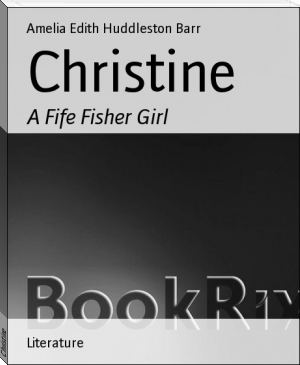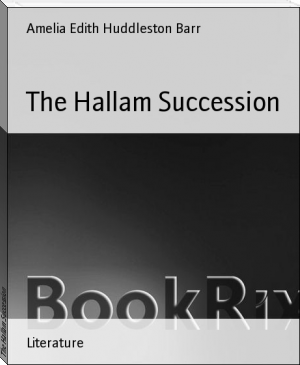Christine, Amelia Edith Huddleston Barr [chromebook ebook reader txt] 📗

- Author: Amelia Edith Huddleston Barr
Book online «Christine, Amelia Edith Huddleston Barr [chromebook ebook reader txt] 📗». Author Amelia Edith Huddleston Barr
"Just sae, Christine. They'll do fine in a fishing boat, among nets and sails. But here! Nay, nay! And then there's the mither o' them! That woman in my place! Can you think o' it, lassie?"
"We'll never speak again o' the matter. I ken how you feel, Mither. It would be too cruel! it would be mair than you could bear."
Then there was a man's voice heard in the living room, and Christine went to answer the call. It was the Domine's messenger, with his arms full of books. And Christine had them taken into her mother's room, and for a whole hour sat beside her and showed her books full of pictures, and read short anecdotes from the magazine volume, and Margot for a while seemed interested, but finally said with an air of great weariness: "Tak' them all awa', dearie. Ye can hae the best bedroom for them."
"Dear Mither, will you let me hae the use o' it? I will keep a' in order, and it is sae near to yoursel', I could hear you if you only spoke my name."
"Tak' the room and welcome. Neil had it for many a year. It has a feeling o' books and lesson-larning in it."
So that night, when her mother was in her first sleep, Christine took her books into this large, silent room. It faced the sea. It had an atmosphere different from that of any other room in the house, and no one but herself was likely to enter it. There was a broad sill to the largest window, and Christine arranged the Domine's books on it. In the dozen or more volumes there was a pleasant variety--history, poetry and the popular novels of the time--especially the best work of George Eliot, Miss Braddon, Thackeray, and Dickens.
It was all so wonderful to Christine, she could hardly believe it. She touched them lovingly, she could have kissed them. For in those days in Scotland, good literature was yet a sort of luxury. A person in a country place who had a good novel, and was willing to loan it, was a benefactor. Christine had borrowed from the schoolmaster's wife all she had to lend, and for several weeks had been without mental food and mental outlook. Was there any wonder that she was depressed and weary-looking?
Now all quickly changed. The housework went with her as if it were paid to do so. She sang as she worked. She was running in and out of Mither's room with unfailing cheerfulness, and Margot caught her happy tone, and they were sufficient for each other. Mother and books would have been sufficient alone, but they had also many outside ties and interests. The Domine allowed Jamie to go to grandmother's once a day. There were Cluny and Neil, and all the rest of the boys, the Domine and the villagers, the kirk and the school; and always Jamie came in the afternoon, and brought with him the daily _Glasgow Herald_. It was the Domine's way. At first he had not consciously recognized what Christine required, but as soon as the situation was evident to him, he hasted to perform the good work, and he did the duty liberally, and wearied not in it.
So the days came and went, and neither Margot nor Christine counted them, and Cluny came whenever he could by any travel get a few hours with Christine. And the herring season came and went again, and was not very successful. Margot and Christine were sorry, but it was no longer a matter of supreme importance. Still, the gossip concerning the fishing always interested Margot, and someone generally brought it to her. If no one did, she frankly asked the Domine what was going on, for he always knew everything affecting the people who sat in Culraine Kirk of Scotland.
Certainly he watched Christine's improvement with the greatest interest and pleasure. In six months she was a far more beautiful woman than she had ever before been. Her soul was developing on the finest lines, and it was constantly beautifying its fleshly abode. The work was like that of a lapidary who, day by day, cuts and polishes a gem of great value. Even Margot occasionally looked intently at her daughter, and said wonderingly, "You are growing very bonnie, Christine, the Domine must hae lost his sight, when he thought you were sick and wearying for a change."
"I'm never sick, Mither. Whiles, when I was worrying mysel' anent Angus Ballister, I used to hae a dowie weariness come o'er me; but since feyther went awa' I havena had as much as a headache. Now if it suits you, Mither, I'll gie you your knitting, I'm wanting to go and write down something."
"Weel, gie me the needles, and gie my love to Cluny, and tell him to bring me ane o' them white fuchsia plants he saw in a Glasgow window."
"I hae given that word already, Mither."
"Do it again, lassie. Any man bides twice telling."
But the writing Christine wished to do was not a letter to her lover. It was some lines that had been running through her mind for an hour, and she knew that the only way in which she could lay their persistency, was to write them down. She had just finished this work, when the door was opened, and the Domine came in, with a gust of wind, that blew the paper on which she was writing across the room. He caught it first, and he smiled when he saw it was poetry.
"I'll even read it, Christine, it might be worth while."
"I couldna help writing the lines down, Sir. They bothered me till I did sae. They always do."
"Oh-h! Then the lines are your own. That is a circumstance I cannot pass."
"Gie them to me, Sir. Please!"
"When I have read them, Christine," and immediately he proceeded to read them aloud. He read them twice, the second time with care and sympathy:
"The boats rocked idly on the bay,
The nets hung straight within the deep,
On the hard deck the fishers lay,
Lost in a deep and dreamless sleep.
Why should they care, and watch, and wake--
Nets of the sleeping fishers take.
Only the sea the silence broke,
Until the Master Fisher spoke.
"O Christ, Thou must have loved the sea,
Its waves held firm Thy steady feet.
Wouldst Thou not talk of boats and nets,
If Thou some fishermen shouldst meet?
Yes, Thou wouldst speak of boats and nets,
Though walking on the golden street.
"And if, O Christ, Thou met'st some day
The Fishermen from Galilee,
Wouldst Thou not speed the hours away,
Recalling life upon their sea?
And sure their hearts would burn and thrill,
Remembering, Thy 'Peace be still!'
"The Crystal Sea could ne'er replace
The old Earth Sea, so wild and gray--
The strain, the struggle, and the race
For daily bread, from day to day.
O Christ! we fishermen implore,
Say not, 'The sea shall be no more.'
"Its tides have seen Thy godlike face--
Look down into its hidden graves,
Have felt Thy feet in solemn pace
Pass through the valley of its waves.
Fisher of Galilee! We pray,
Let not the Earth Sea pass away."
"Weel, Sir, will you give me the bit paper now?"
"I want you to give it to me. In a year I should like to read it again, and see how you have improved."
"Take your will wi' it, Sir."
"To write poetry teaches you how to write prose--teaches you the words of the English language, their variety and value. A good prose writer can write poetry, for he is acquainted wi' words, and can always find the word he wants; but a good poet is not often a good prose writer."
"How is that, Sir?"
"Because he is satisfied with his own vehicle of expression. He thinks it is the best. I am glad you have begun by writing poetry--but do not stop there." As he was speaking he folded up the bit of paper in his hand, and put it into his pocketbook. Then he went to speak to Margot.
"Margot," he said, "what do you think? Christine has been writing a poem, and it is better than might be."
"Christine has been making up poetry ever since she was a bit bairn. She reads a great deal o' poetry to me out o' the books you sent her. Oh, Domine, they hae been a wonderfu' pleasuring to us baith! Though I never thought I wad live to find my only pleasure in novels and bits o' poetry. Three or four years ago I wad hae laughed anyone to scorn who said such a thing could happen to Margot Ruleson. 'Deed wad I!"
"God often brings the impossible to pass, and even nourishes us on it. What has Christine been reading to you?"
"She has read to me the doings o' David Copperfield, and about that puir lad, Oliver Twist. I was greatly ta'en up wi' the lads. I maist forgot mysel', listening to their troubles and adventures."
"Very good, Margot. What is she reading to you now?"
"A book by a Mr. Thackeray. His picture is in the book. It's what they ca' a frontispiece. He has a big head, and he isna handsome, but he looks like he could mak' up a good story."
"Is the book called 'Vanity Fair'?"
"That's the very name. I dinna see yet the meaning o' it."
"Do you like it?"
"Weel, I like the folks best that I shouldna like. There's an auld woman in it, that I wad gie a cup o' tea and an hour's crack to, any day, and be glad o' the pleasure o' it; and there's the girl, called Becky, that isna at a' a kirklike girl, but I canna help liking her weel. I think I wad hae been her marrow, if I had been born and brought up as she was. I'm sure it must be gey hard for men to mak' up the likeness o' a real good woman--they mak' them too good, you feel as if they should be in heaven, and mostly I find they send them there by early death, or some other disease, or mischance."
"So you like Becky?"
"I do. There's circumstances, Sir! They alter cases. They do that! If a woman has the fight wi' the warld on her hands, she'll be requiring a little o' the deil in her, just to keep the deil out o' her. I hope the man Thackeray has had sense enou' to mak' Becky come a' right at the lang end."
"I believe she becomes very respectable, and joins the Church of England."
"That would be the right thing for her. I hae heard that it is a vera broad church, and that its deacons----"
"Wardens, Margot."
"Wardens be it. I hae heard that they dinna dog its members round Sunday and work days, as our deacons





Comments (0)